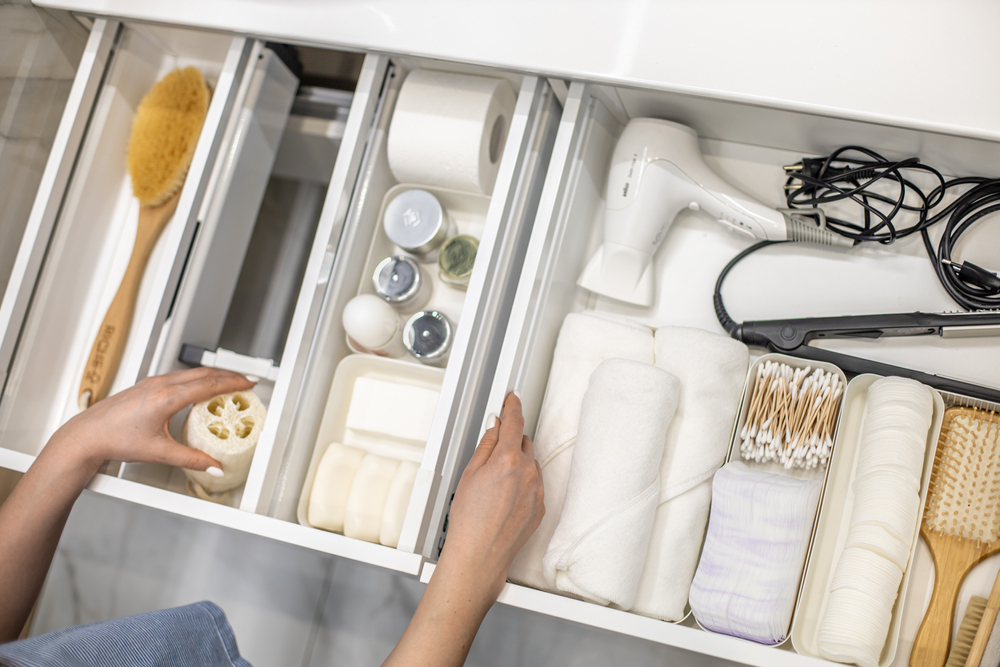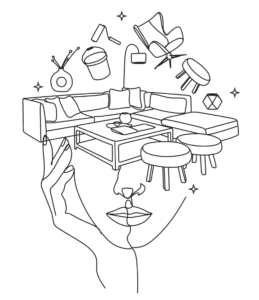Welcome to Professional Organizer Aimee Hutzell of Inspired Living NW! In this guest blog, Aimee shares her organizing philosophy, plus tips and strategies for staying focused and getting the most out of each organizing session.

One of our goals with the Career Insight Studio blog is to share helpful insights and resources that will make an immediate difference in your daily work and home life.
Getting (and staying) organized, whether it’s the pantry or your office, can be a tough one for many working parents. I am so excited to present Aimee Hutzell, superstar Professional Organizer and owner of Inspired Living NW in Portland, Oregon as a resource. Aimee is here to help us untangle some of the most common challenges when it comes to staying organized.
Full disclosure: Aimee has helped me with organizing projects many times, and her expertise and wisdom are worth every penny! I love the feeling of having an organized space. With my busy work schedule, she’s been extremely helpful as I often felt overwhelmed trying to tackle big organizing projects on my own.
Aimee has been assisting individuals and families in decluttering, organizing, and reclaiming their living spaces since 2016. In this exclusive interview, we delve into Aimee’s journey, her unique approach to organizing, and her valuable insights on how to create a plan to conquer the clutter and step into peace.
What made you want to become a professional organizer?
I grew up in a household that struggled with chronic disorganization and hoarding disorder. At a super young age, I started organizing my own space as a self-soothing technique. I quickly saw that the structure I created had a major impact on how I felt.
As an adult, I realized the potential for helping those around me with organizing, and how good it felt to give back. Everything in my brain just clicked. It was a way for me to be of service.
One of the things many people struggle with is being an organized person living under the same roof with a disorganized person. How do you help your clients deal with that situation?
First of all, it’s important to remember that we are not all naturally gifted at everything, and that includes organization. However, it CAN be a learned skill.
Also, the less stuff we have, the more successful we are at staying tidy. When the brain isn’t naturally organized, people tend to obtain more stuff and the “edit” function doesn’t work as well. Once they are able to learn their weak points, then they can interrupt the behavior and make a different choice.
In short, just because someone isn’t naturally organized doesn’t mean they can’t train their brain to think that way! Whether it’s a spouse, partner, child or even colleague, learning WHY the person struggles is the first step toward accepting them and then helping them move forward to make different choices.
Brain-based conditions can also be a factor here. An ADD/ADHD diagnosis can help. Seeing a therapist is really important in these situations.
 So is resistance to organizing sometimes a bigger factor than ability?
So is resistance to organizing sometimes a bigger factor than ability?
Yes, there is so much shame and limiting beliefs that help to create a “story” behind the reason why a person is disorganized. Then it becomes a part of
their identity. Breaking off from this false belief is a big piece of healing and moving forward. How can we put supports in place as they learn this new
skill? The willingness to participate is integral.
Organization is also about setting boundaries. When you do it with physical items, it starts to occur to all other aspects of your life (relationships, career etc).
Doing the work of organizing with the help of a Professional Organizer can help bring all of these things to light.
How can a person know whether they would benefit from working with an organizer or whether they could just do it themselves?
Great question. First you need to ask yourself: do I lack motivation or do I lack structure? Working with an organizer can look like different things for different people. For example, sometimes I just act as a consultant. I give the client a “jump start” and the motivation they need to set a game plan in motion. Then they do it on their own.
However, if you want to get organized and it’s just not happening, you probably need support in some capacity. Play scientist and say “what have I tried so far”? If it’s not working, it may be time to call in a professional.
We all need support in some area or another, and there is absolutely no shame in relying on outside help to get there.
What is your best advice for people trying to organize on their own and getting overwhelmed?
The main thing that people always underestimate is how much time they need. Organization is a labor of love and can be a huge time commitment. When you miscalculate how long it will take, you perpetuate the shame cycle because you are essentially setting yourself up for failure. Being realistic about that piece will help you to give yourself grace to take your time and make mistakes.
Again, playing scientist gives you the data you need to take action. Notice how you feel when you try to organize, how long it takes, etc. Ask yourself what you need to be successful before you start.
How should someone prepare for a successful organizing session?
This work is physically and mentally draining. Some of the things they can do to support the body and brain before a session are to eat a good breakfast, decrease distractions, put the phone away. This signals to your brain that organizing is your main priority. There is also a great article on the NAPO Oregon website with a checklist on how to prepare for your session.
What do you do as the organizer to create a successful environment for them during the session?
I always like to start by setting intentions around what we’ll accomplish. Then I make sure that the client has supports set in place during the session. For example, we might establish when the break times will occur.
I have a client who loves cheese, and we like to do a quick little sampling of cheeses as breaks during the session. These rewards give dopamine to the brain and allow us to work towards something fun! We also set the intention to stay in the room and remain focused.
It’s also important to do some self-care after the organizing session to make it sustainable. I recommend blocking off time for a cup of coffee, give yourself time to tidy up and take a rest so that you aren’t leaving organizing projects out and in transition. Making sure I leave your home with everything in place is important to me.
Above all, remember that organizing is a process. Figuring out what works best for you is key!
Stay tuned for the next installment in this series, where Aimee will share her favorite – and least favorite – organizing products.
Happy Organizing!



